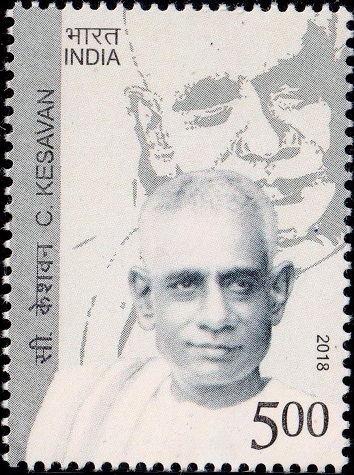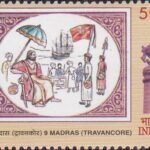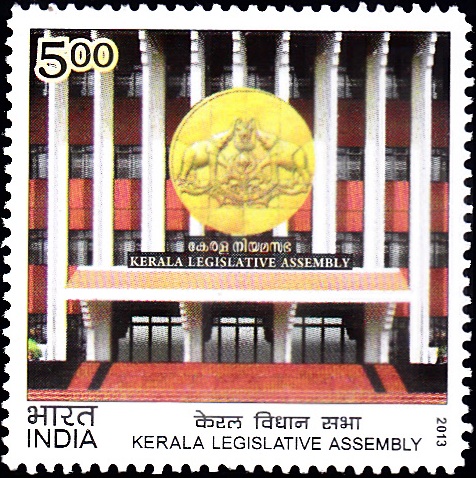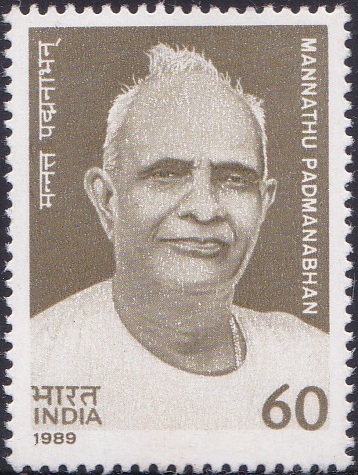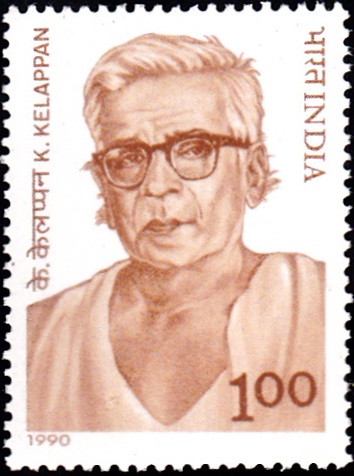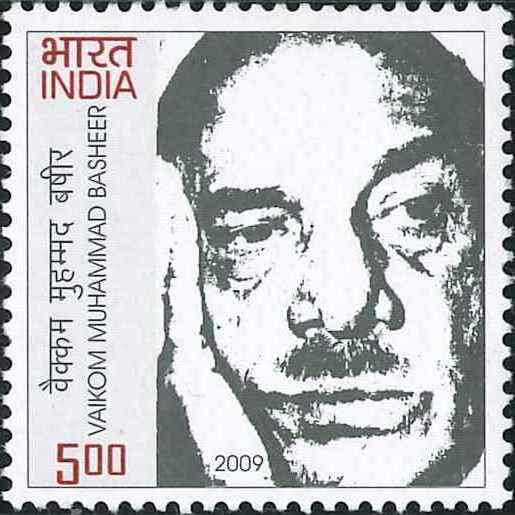
Vaikom Muhammad Basheer
A commemorative postage stamp on the Birth Centenary of Beypore Sultan Vaikom Muhammad Basheer, an Indian Malayalam freedom fighter and writer :

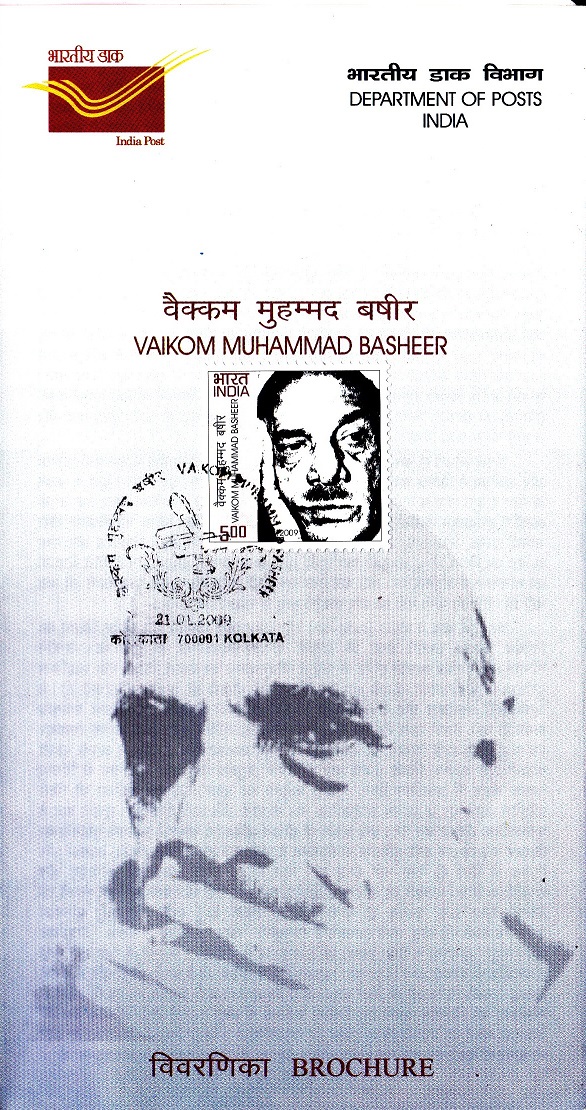 Issued by India
Issued by India
Issued on Jan 21, 2009
Issued for : India Post is happy to issue commemorative postage stamp on Vaikom Muhammad Basheer.
Credits :
Stamp, FDC & Cancellation : Alka Sharma
Type : Stamp, Mint Condition
Colour : Multi colour
Denomination : 500 Paise
Stamps Printed : 0.4 Million
Printing Process : Wet–offset
Printer : Security Printing Press, Hyderabad
Name : Abdul Rahman Muhammad Basheer
Born on Jan 19, 1908 at Thalayolaparambu, Kottayam district, Kerala, India
Died on Jul 5, 1994 at Beypore, Kozhikode district, Kerala, India
About :
- Vaikom Muhammad Basheer was born in the village of Thalayolapparampu in northern Travancore, in Vaikom on 21 January 1908, he was the eldest child. His father was in the timber business as a contractor, but the business did not do well enough for his large family to live in anything luxury. After beginning his education at the local Malayalam medium school, he was sent to the English medium school in Vaikom, five miles away. While at school he fell under the spell of Mahatma Gandhi. He started wearing Khadder, inspired by the swadesi ideals.
- He resolved to join the fight for an Independent India, leaving school to do so while he was in the fifth form. Since there was no active independence movement in Travancore or Kochi – being princely states – he went to Kozhikode to take part in the Salt Satyagraha in 1930. He was arrested and sent to Kanpur where he got inspired by historic stories of Bhagat Singh, Sukh Dev, Rajguru. He and about 600 political prisoners then at Kanpur were released after the Gandhi–Irwin pact of March 1931, he was freed from prison, he organized an anti-british movement and edited a revolutionary journal, Ujjivanam (‘Uprising’). A warrant was issued for his arrest and he left Kerala.
- After leaving Kerala, he embarked upon a long journey that took him across the length and breadth of India and to many places in Asia and Africa, a journey which spanned seven years, doing whatever work that seemed likely to keep him from starvation. His occupations ranged from that of a loom fitter, fortune teller, cook, newspaper seller, fruit seller, sports goods agent, accountant, watchman, shepherd, hotel manager to living as an ascetic with Hindu saints and Sufi mystics in their hermitage in Himalayas and in the Ganga basin, following their customs and practices, for more than five years. There were time when, with no water to drink, without any food to eat, he came face to face with death.
- After the journey, when returned to Kerala (1936-1937) – where he chose to live for the rest of his life – he found that his family had gone bankrupt. He tried to make a living as sports agent in Ernakulam. After a bicycle accident, he lost the job, and wandered searching for a new one. He walked into the office of a newspaper ‘Jayakesari’ whose editor was also its sole employee. He did not have a position to offer, but offered to pay money if Basheer wrote a story for the paper. Basheer wrote his first story Ente Thankam (which was later published in the collection Vishappu under the name Thankam) at his request; the main character of the story based on a woman he saw everyday coming to draw water at a public water pipe in front of his residence.
- Following this, he became a full time writer. During this period, he was near starvation most of the time. He struggled to pay rent and could not find money even for ink, paper and stamps, yet he wrote prolifically, stories, poems and political essays and sent them to various newspapers and publishers, for which he was rarely paid. Basheer’s short-book Hathabhaagyayaaya ente naadu (My ill-fated motherland) and one act play Pattahinte Pekkinaavu (The terrible nightmare of Pattam) were banned in Travancore and a warrant issued for his arrest if entered Travancore. He met Shri M.P. Paul, who offered lodging at Pauls’s tutorial college, and also offered him to supervise the mess at the college. When Paul’s tutorial shifted to Kottayam, Basheer also went to Kottayam. It was during a meeting of writers Sahitheesakhyam at Kottayam that Basheer read his draft of Baalyakaalasakhi.
- At Kottayam (1941-42), he was arrested and put in a police station lock-up, and later shifted to another lock up in Kollam Kasba police station. The stories he heard from policemen and prisoners they appeared in his later works, and he wrote a few stories while at the lock-up itself. He spent a long time in lock-up awaiting trial and after trial was sentenced to two years and six months imprisonment. He was sent to Thiruvananthapuram central jail. While at jail, he forbid M.P. Paul from publishing Baalyakaalasakhi. He wrote Premalekhanam (1943) while serving his term and published it on his release. Baalyakaalasakhi was published in 1944 after further revisions, with an introduction by Paul.
- He then made a career as a writer, initially publishing the works himself and carrying them to homes in order to sell them. He ran two bookstalls in Ernakulam, Circle Book House and later, Basheer’s bookstall.
- After Independence, he showed no further interest in active politics.
- He suffered from mental illness and was twice admitted to mental sanatoriums. He wrote one of his famous works, Paaththummaayude aadu (Pathumma’s Goat), while undergoing treatment in a mental hospital in Thrissur. The second spell of paranoia occurred after his marriage when he had settled down at Beypore. He recovered both times, and continued his writings.
- Basheer is known for his unconventional style of language. He did not differentiate between literary language and the language spoken by the commons and did not care about the grammatical correctness of his sentences. Initially, even his publishers were unappreciative of the beauty of this language; they edited out or modified conversations. Basheer was outraged to find his original writing transcribed into “standardized” Malayalam, devoid of freshness and natural flow, and he forced them to publish the original one instead of the edited one. Almost all of Basheer’s writing can be seen as falling under the heading of prose fiction – short stories and novels, though there is also a one-act play and volumes of essays and reminiscences. Basheer’s fiction is very varied and full of contrasts.
- There are poignant situations as well as merrier ones – and commonly both in the same narrative. There are among his output realistic stories and tales of the supernatural. There are purely narrative pieces and others which have the quality of poems in prose. In all, a superficially simple style conceals a great subtlety of expressions.
- Basheer is fondly called as Beypore Sultan (Sultan of Beypore). Though his works have been translated to English and eighteen Indian Languages, the peculiarity of the language he uses makes the translations lose a lot of sheen.
- The government recognized his contributions by awarding him prestigious Padma Sri in 1982.
- He passed away in Beypore, on 5 July 1994.
- Text : Based on material supplied by the proponent.
Subscribe
Login
0 Comments
Oldest


